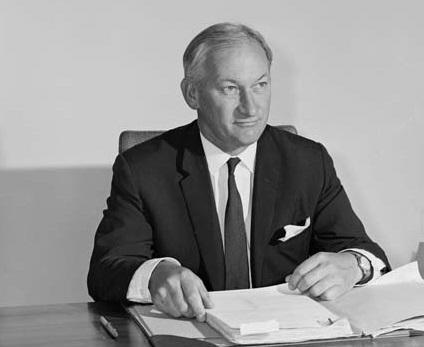Sir Arthur turns 100
Posted By Peter Edwards on August 18, 2014 @ 14:30
 [1]Most readers of The Strategist will be aware that 18 August is Vietnam Veterans’ Day, formerly known as Long Tan Day, marking the anniversary of the most famous battle fought by the Australian Task Force in Vietnam, in 1966. This year it also marks the centenary of the birth of perhaps the country’s most famous—or notorious—defence mandarin, Sir Arthur Tange (18 August 1914–10 May 2001). Some reflections on his legacy are timely.
[1]Most readers of The Strategist will be aware that 18 August is Vietnam Veterans’ Day, formerly known as Long Tan Day, marking the anniversary of the most famous battle fought by the Australian Task Force in Vietnam, in 1966. This year it also marks the centenary of the birth of perhaps the country’s most famous—or notorious—defence mandarin, Sir Arthur Tange (18 August 1914–10 May 2001). Some reflections on his legacy are timely.
First, he had an enormous impact on the two departments of which he was head for 11 and ten years respectively, External Affairs (as Foreign Affairs was then known) and Defence. When he became Secretary of External Affairs in 1954, aged 40, it was a collection of individuals, many of them highly talented, but not well organised for policy advice and implementation. When he left, it was a far more efficient and effective body. Its role in the Indonesian Confrontation of 1963–66 has been described as world’s best practice. After ten years, he was finally eased out by a new minister, Paul Hasluck, at the direction of the long-serving Prime Minister Robert Menzies, but was allowed to remain in office, albeit with minimal influence, for a whole year. That, unfortunately, was the year in which crucial decisions were made leading to the commitment of combat forces to Vietnam. The frosty relationship between Tange and Hasluck, two formidably able individuals, prevented them from forming an effective working relationship, which might have greatly improved Australia’s Vietnam policy.
On and around Russell Hill, Tange is still revered by some and reviled by others as the principal author of ‘the Tange report’ which led to ‘the Tange reforms’ of Defence in the mid-1970s. In a massive upheaval five departments (Defence, Army, Navy, Air and Supply) were merged into one and three services were brought into one Australian Defence Force. One outcome, still challenged by some, was the ‘diarchy’ under which the Secretary and the Chief of Defence Force are jointly responsible to the Minister. Tange’s vigorous deprecation of the capacity of many military officers, especially the ‘Tange harangue’ to an Army gathering, became legendary but the argument behind it was less well understood. When Duncan Lewis became in 2011 the first former military officer to be appointed Secretary of Defence, journalists said that Tange would have been turning in his grave. That’s unlikely: he wanted senior ADF officers to become good public servants, willing and able to contribute to policy on strategic and what he called ‘higher defence policy’, not merely military matters. Lewis’s last major speech at Defence [2] referred extensively to Tange’s dictum that talking strategy means talking dollars.
Tange supported ‘jointery’ and especially the Australian Defence Force Academy, where officer cadets from all three services could receive a ‘broad and liberal’ tertiary education. He insisted that the curriculum should include humanities and social sciences. He would almost certainly have been delighted that a PhD graduate in social sciences from ADFA, David Kilcullen, has become a world authority on the sociology, politics and anthropology of terrorism and counter-insurgency.
Tange’s role in reforming strategic policy, as well as the structures by which it is made, is less well known but no less important. He strongly endorsed, and possibly coined, ‘self reliance’ as the concept to replace ‘forward defence’, and he supported the idea of defence focused on the continent and its approaches. But that didn’t mean a wholesale rejection of the US alliance—an issue on which he sparred in his later years with his friend and admirer Malcolm Fraser. Tange’s subtle balance between robust independence and alliance confused many. His defence of the joint facilities in 1975 led some left-wing journalists to portray him, wrongly, as the evil genius behind the sacking of the Whitlam government; while some military and political conservatives thought his support for ‘self-reliance’ was foolish anti-Americanism.
My biography of Tange [3] is sub-titled ‘last of the mandarins’ because the supposed influence of Tange and others who lunched at the Commonwealth Club led the Hawke government and its successors to introduce reforms to place ministers firmly in charge of public servants, not the other way round. Many of those reforms were appropriate. Nevertheless, those interested in public policy would do well to look again at the era of Tange, the ‘seven dwarfs’ and other great public servants. There have been losses as well as gains in the transition from government by mandarins to government by managers. And while the strategic challenges facing Australia are different from those of the 1960s and 1970s, we have no less need for the intellectual rigour that he applied to strategic policy-making.
Peter Edwards is the author of ‘Arthur Tange: Last of the Mandarins’ (2006). Image courtesy of National Archives of Australia [4].
Article printed from The Strategist: https://aspistrategist.ru
URL to article: /sir-arthur-turns-100/
URLs in this post:
[1] Image: https://aspistrategist.ru/wp-content/uploads/2014/08/Tange-4.jpg
[2] Lewis’s last major speech at Defence: https://www.aspistrategist.ru/events/aspi-annual-dinner-2012-talking-dollars-and-strategy-the-challenging-link-in-defence-planning
[3] My biography of Tange: http://www.bookdepository.com/Arthur-Tange-Peter-Edwards/9781741146424
[4] National Archives of Australia: http://recordsearch.naa.gov.au/scripts/PhotoSearchItemDetail.asp?M=0&B=30836525&SE=1
Click here to print.